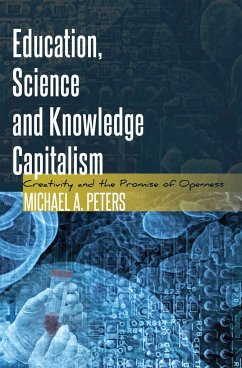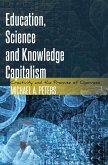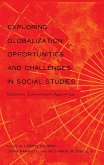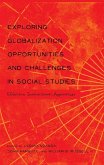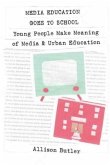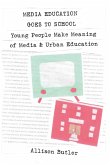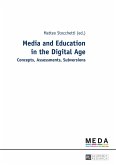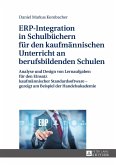We live in the age of global science - but not, primarily, in the sense of 'universal knowledge' that has characterized the liberal metanarrative of 'free' science and the 'free society' since its early development in the Enlightenment. Today, an economic logic links science to national economic policy, while globalized multinational science dominates an environment where quality assurance replaces truth as the new regulative ideal. This book examines the nature of educational and science-based capitalism in its cybernetic, knowledge, algorithmic and bioinformational forms before turning to the emergence of the global science system and the promise of openness in the growth of international research collaboration, the development of the global knowledge commons and the rise of the open science economy. Education, Science and Knowledge Capitalism explores the nature of cognitive capitalism, the emerging mode of social production for public education and science and its promise forthe democratization of knowledge.
«In 'Education, Science and Knowledge Capitalism: Creativity and the Promise of Openness', Michael A. Peters provides us with unequalled insight into the trends of our time, and persuades us of our potential to design the future. His materials, it seems, are the whole of nineteenth- and twentieth-century thought, reworked in novel and constructive ways, and with his characteristic directness and clarity. This is one of the very best of Peters' fecund works. Highly recommended.» (Simon Marginson, Professor of Higher Education, University of Melbourne)
«Science is the powerhouse of modern capitalism. Education is the crucible of science. Michael A. Peters' book unpicks the complex, potent relationships between economy, education and science. He does this in a crisp, stylish and lucid manner. He leaves us with a compelling sense of how scientific ingenuity propels capitalism's most audacious innovations. Capitalism's dialectic of free inquiry and intellectual property turns knowledge into capital, and capital into a kind of congealed cognition. Peters' account of this is of great interest.» (Peter Murphy, Professor of Creative Arts and Social Aesthetics, James Cook University)
«In this thoughtful and engaging volume, Michael A. Peters demonstrates precisely those qualities he seeks to analyse in the book: creativity and openness. In so doing, he helps us to better understand the politics of knowledge under contemporary capitalism and to reconsider the nature and significance of education in the twenty-first century.» (Peter Roberts, University of Canterbury, New Zealand)
«Science is the powerhouse of modern capitalism. Education is the crucible of science. Michael A. Peters' book unpicks the complex, potent relationships between economy, education and science. He does this in a crisp, stylish and lucid manner. He leaves us with a compelling sense of how scientific ingenuity propels capitalism's most audacious innovations. Capitalism's dialectic of free inquiry and intellectual property turns knowledge into capital, and capital into a kind of congealed cognition. Peters' account of this is of great interest.» (Peter Murphy, Professor of Creative Arts and Social Aesthetics, James Cook University)
«In this thoughtful and engaging volume, Michael A. Peters demonstrates precisely those qualities he seeks to analyse in the book: creativity and openness. In so doing, he helps us to better understand the politics of knowledge under contemporary capitalism and to reconsider the nature and significance of education in the twenty-first century.» (Peter Roberts, University of Canterbury, New Zealand)

